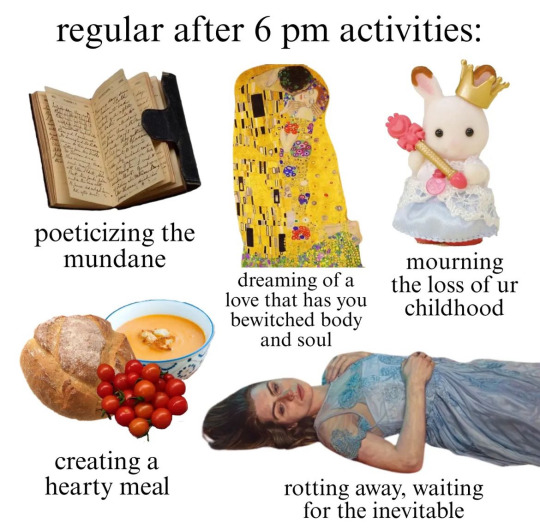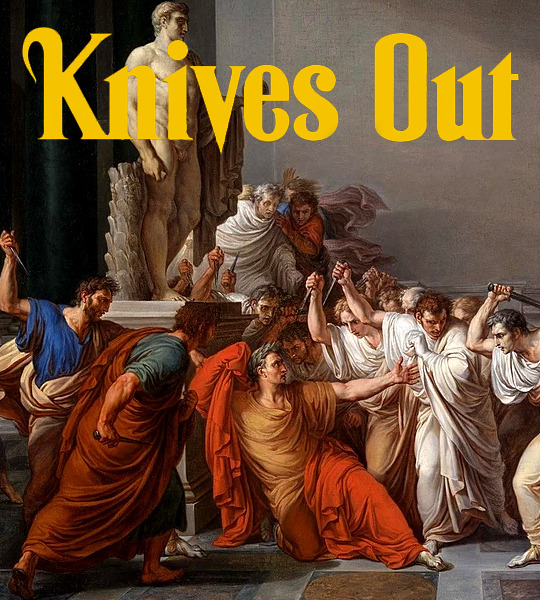I am only a little bit pretentious but I swear it’s in like a cute charming sort of way
Don't wanna be here? Send us removal request.
Text

The Swan, No. 1 by Hilma af Klint is one of her most well known works.
24K notes
·
View notes
Text
It’s summer now, and you’re craving a simpler existence. You want to read. You want to write.
Caleb Azumah Nelson, Open Water
136 notes
·
View notes
Text
this is girlhood. ethiopian skater girls. source
19K notes
·
View notes
Text
I really like the word “smitten”. because at first glance you just think of sappy lovey-dovey stuff but also you have to remember this is a word that’s born of the word “smite.” a devastating word. a word that, summarized, means stricken. smitten means stricken as well — struck with devastating affection.
101K notes
·
View notes
Text
I think the hot new trends for this summer should be reading comprehension and critical thinking skills
153K notes
·
View notes
Text
I hate that SEPTember OCTOber NOVember and DECember aren’t the 7th, 8th, 9th, and 10th months.
535K notes
·
View notes
Text
nah cause the fact that jane austen wrote a character like emma woodhouse is still insane to me. she threw all the standards out the window and was like hey, here’s this incredibly complex and nuanced character, she’s selfish, privileged, manipulative and arrogant, but she’s also really fucking kind, she would do anything for those she loves (including sacrificing a lot of her liberties), she is able to admit that she’s made a mistake and grow from it, because those things are not mutually exclusive. and i think the reason why everyone is trying to girlbossify their heroines to make them like lizzie bennet (which is an insult to her character but that’s another story) is because they’re scared to write characters like emma. which is understandable, because she’s unlikeable-ish, and they don’t want to take that risk.
honestly the way jane wrote emma is IMPECCABLE and not everyone can pull it off, but i wish female characters with actual flaws were more popular.
5K notes
·
View notes
Text
I've said it before, but I reread Emma, so I'm saying it again.
George Knightley is THE Austen Hero. He is kind, compassionate, never condescends. He is so nice that not once, but TWICE, he is mistaken for being in love when he's not. He may be strict and rational, but he isn't cold. He plays with his nieces and nephews and helps keep the peace between family members. He calls Emma out, but only because he wants to help her be the best possible version of herself. He moves into Hartfield at the end, something completely unheard of in those days, because he knows Emma would never leave her father and he would never ask her to.
He is just. The Peak.
2K notes
·
View notes
Text
In Emma, the incident that sparks the story isn't a death or a loss of fortune or even someone new coming to town. It's a wedding. A happy event, usually the end of a story. But I like how this acknowledges that even a happy event like a wedding can bring its own kind of sorrow. Emma's happy for Miss Taylor, but she still mourns the way that her life has to change. Marriage can massively alter social circles, especially for women, taking them away from the home sphere and into a new life, and forcing the people they leave behind to deal with the loss. Here, it's a good change, but it's still a change.
Emma's in a unique position among Austen heroines. She's got money, a comfortable home, a loving father who would prefer she stay in his household for the rest of her life. She doesn't have to consider matrimony as a business arrangement the way some heroines have to. If she marries, it's going to be almost solely for companionship.
Because that's the one thing Emma lacks. She's lonely. She loves her father, but he's not someone she can engage with socially or intellectually. She ranks above everyone in town, so there's no one who can be on an equal level with her. Her father won't travel, so she can't get involved in social events with people who are of her rank and happen to live a little further out. Her attachment to Harriet is a desperate attempt to create a companion of her own social rank, and then marry her to Elton so she can remain in Emma's social circle. Mrs. Martin would be just another farmer's wife who sits below Emma's level; Mrs. Elton can be her equal.
But we can't overlook the fact that Emma makes the situation worse through snobbery. She's not only of a higher social rank than the people around her--she feels herself superior to them. Her father has plenty of friends, but to her, Mrs. Goddard and Miss Bates are just "prosy old ladies". Which is fine--they're more of her father's age, not hers. But it does indicate a wider personality problem. There's more than a hint of Mr. Darcy about the way she goes about detaching Harriet from Mr. Martin because he's so "coarse and vulgar", and trying to raise her up to Emma's standards of what's acceptable.
So, anyway, Emma's uniquely positioned in a story where friends-to-lovers has to be the character arc. And in the process, she's got to overcome her sense of superiority that makes it so difficult for her to classify people as friends.
843 notes
·
View notes
Text
my holy trinity
"I cannot fix on the hour, or the spot, or the look or the words, which laid the foundation. It is too long ago. I was in the middle before I knew that I had begun."
Pride and Prejudice
"I cannot make speeches, Emma...If I loved you less, I might be able to talk about it more. "
Emma
"You pierce my soul. I am half agony, half hope."
Persuasion
501 notes
·
View notes
Text
Jane Austen was 100% correct when she wrote the line ‘If I loved you less I might be able to talk about it more’
2K notes
·
View notes
Text
Jane Austen was so insane for writing Emma I’m losing my mind
Like you have the mean bossy femme lesbian in her late 20’s, living off her trust fund and becoming hyper-obsessed with a local pretty peasant girl Jennifer’s Body style. People call her perfect, and she knows they’re right
(They’re wrong. Her childhood best friend - her metaphoric conscious - reminds her every day.)
She’s the protagonist of this book but the antagonist of every other: she’s Caroline Bingley, Blanche Ingram, Cordelia Chase, Regina George, Heather Chandler. She’s the queen of this school, and popularity is a hell of a drug.
(Popularity is the only power she has. There’s something itching at the back of her brain: She doesn’t want to be this. She doesn’t want to do this. Why is she trying to impress all these mean people.)
She can do no wrong. She mocks the annoying weird girl and everybody laughs and the weird girl finally shuts up.
(He’s frowning at her in the background. She’s frowning at herself. She’s angry at both of them)
People think she’s charming and beautiful and so kind.
(They’re wrong.)
She keeps everybody at arm’s length, staying mean and fiercely independent.
(They can’t see her loneliness. Her failures. The way she watches her pretty new friend laughing joyfully and beautifully in the sun, and it just makes her feel sad.)
She plays Cupid because she sees people as her play things - love is just a game for her.
(She plays Cupid because she knows that everybody will leave her in the end, anyways. This just allows her to control it.)
Jane Austen famously called Emma “a heroine whom no one but myself will much like.”
(I like her too)
310 notes
·
View notes




